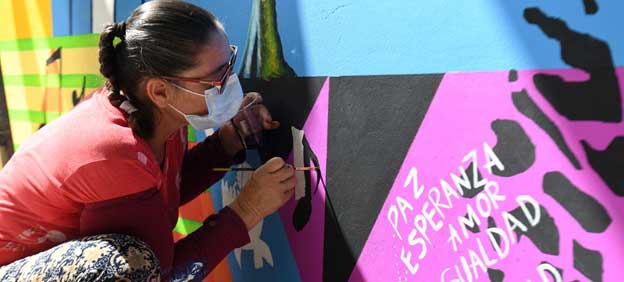Colombia’s New President May Need U.S. Blessing to Realize his Domestic Agenda

GENEVA, Aug 09 (IPS) - For the first time in its contemporary history, Colombia has a left-wing government. The presidency of Gustavo Petro, who took the reins August 8, marks a significant break from the political status quo. He also represents a stiff test for U.S. influence in Latin America.
Colombia is Washington’s most enduring ally in the region, and in recent years their relationship has been built around combatting the nation’s drug cartels. But despite major efforts to curb supply, Colombia remains a top source of cocaine for the United States.
The United Nations Office on Drugs and Crime (UNODC) recently estimated that Colombia’s cocaine harvest hit a record high in 2020. On the back of new coca varieties (the base ingredient for cocaine) and better cultivation techniques, Colombia’s potential output reached 1,228 tonnes in 2020. This was triple the 2010 level and four times greater than in the early 1990s, when Pablo Escobar was at the height of his infamy.
Since launching its controversial ‘war on drugs’ in 1971, successive Republican and Democratic administrations have supplied more than $13 billion in military and economic aid to Colombia. To little avail.
According to a 2021 United States’ Drug Enforcement Agency report, over 90 percent of the cocaine seized in the U.S. originates from Colombia. The U.S. remains the biggest consumer market for Colombian cocaine.
Petro is among those who have denounced the U.S.’s counter-narcotics strategy as counterproductive. In particular, he’s taken aim at US-backed aerial fumigation campaigns to destroy coca fields.
He favours expanding crop substitution programs that provide credit, training and enhanced land rights to rural farmers. For Petro, tackling Colombia’s violent drug trade is bound up with the county’s historic land ownership inequality.
He has also been an ardent critic of Colombia’s free-trade agreement (FTA) with the U.S. for pushing farmers into coca production and for exacerbating Colombia’s over-reliance on fossil fuel and coffee exports.
At the same time, imports from America’s highly subsidized agricultural sector have displaced whole segments of Colombia’s agrarian economy, forcing thousands of farmers into coca production.
Petro’s election campaign called for “smart tariffs” to protect Colombia’s rural farmers from U.S. imports and, by extension, criminal activity. “The free trade agreement signed with the United States handed rural Colombia to the drug traffickers,” he told the Financial Times in May. What’s more, he noted that “agricultural production cannot be increased if we do not renegotiate the FTA.”
An ex-member of the M-19 guerrilla group, Colombia’s new president has vowed to tackle asymmetric trade relations in line with land reform and the drug trade. But he will likely face severe opposition from the armed forces, who themselves fought leftist guerrilla movements during Colombia’s 52-year civil conflict.
Further, the military have a longstanding role in the U.S.-led war on drugs. For his part, Petro has accused Colombia’s top brass of corruption and human rights abuses, even since the Government-Farc peace treaty of 2016.
Elsewhere, the President faces a divided congress and deep hostility from landowning elites. It will require skilful manoeuvring to unite a fractured country around his domestic policies. And even if Petro can generate sufficient national support around his policy aims, he would still need to convince the Biden administration to back-track on the U.S.’s ideological commitment to free trade.
So, what cards can Petro play?
His opening gambit is likely to be a financial argument. While cocaine overdoses claim far fewer lives than opioids, the fiscal costs associated with interceding cocaine into the U.S. are staggering.
Navy and Coast Guard seizures alone cost American taxpayers US$56 billion in 2020, to say nothing of land border expenditures. State funds are also used for cocaine-linked policing, incarcerations and medical treatment.
The current geopolitical landscape may also provide Petro with an unlikely Trump card. Given President Joe Biden’s condemnation of Russia’s invasion of Ukraine, he will be careful avoid pushing Colombia (which he has described as a security “linchpin”) into a closer embrace with Cuba and Venezuela, who are diplomatically aligned with the Kremlin.
To isolate Russia even further, Biden will likely soften America’s stance in renegotiating its FTA with Colombia.
Last month, senior representatives from the Biden administration met with Petro to discuss, among other things, the FTA. While the U.S. has taken tentative steps towards renegotiating the deal, Petro should be wary of a favourable result.
Over the past twenty-five years, an intricate web of government and military bureaucracy has been constructed around U.S.-Colombian counter-narcotics operations. It will be difficult to disentangle.
IPS UN Bureau
Follow @IPSNewsUNBureau
Follow IPS News UN Bureau on Instagram
© Inter Press Service (2022) — All Rights Reserved. Original source: Inter Press Service
 Global Issues
Global Issues